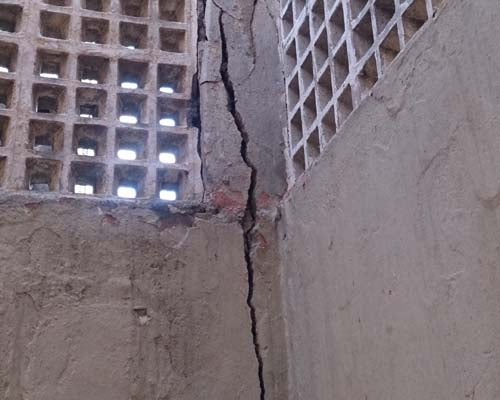The special properties of hardened concrete are the main reason for using concrete as a building material in most structures.
Hardened concrete has special properties that cannot be achieved using other materials.
Concrete is a very special invention of humanity that has allowed the construction industry to reach a new level.
Let's discuss them in detail.
Properties of hardened concrete
Among many other properties, we discuss the special properties of concrete. All civil engineers and structural engineers must be aware of this.
This facilitates quality control and assurance processes.
Mechanical solidity
The mechanical strength of concrete consists of two components and these properties are the main reason for the wide use of concrete as a construction material.
Concrete is very compressive and weakly elastic. In general, the tensile strength of concrete is about one-tenth of its compressive strength.
The nature of strengths is as follows.
- Compressive strength
The most important and widely used concrete is because it has greater compressive strength. Concrete strength is represented by Concrete Quality . Starting with C15, C20, C25, C30… there are many other types of concrete.
The quality of concrete is determined by construction and is called characteristic strength of concrete .
The different compressive strength of concrete is achieved by Concrete Mix Design . Changing mixing proportions is the key to different characteristic intensities.
Below are some of the main reasons why concrete has different strengths.
-
- Water-cement ratio – here the increase in cement content has a direct effect on the strength of the concrete.
- Fine grain content
- Granulation
- General course content
- Overall course grade
- Tensile strength of concrete
The tensile strength of concrete is generally not taken into consideration in construction planning, especially in normal reinforced concrete structures.
However, when designing prestressed concrete and prestressed structures, we take into account the tensile strength of the concrete. As the quality of concrete in prestressed/prestressed structures is higher, we can achieve adequate tensile strength, although it is only one-tenth of the compressive strength. Therefore, the tensile strength of concrete can be considered as one of the good properties of hardened concrete.
Some other factors affect the strength of concrete.
- Concrete hardening
- Concrete compaction
- Test Method – Errors and Omissions
- Use of additives – there may be an indirect effect.


Concrete durability
Concrete durability is a property of hardened concrete.
There are many facts about the durability of concrete. If the Durability of concrete is the key to maintaining the structure throughout its intended lifespan.
Some of the properties of concrete associated with durability are as follows.
- UV resistance
- Chemical resistance
- Exposure to sea water
- Chloride and corrosion resistance of steel
- Sulfate resistance
- Alkali-silica reaction resistance (AKR)
- Abrasion resistance
- Frost and thaw resistance
Concrete porosity and density
The porosity and density of concrete are related. The greater the porosity of the concrete, the lower the density of the concrete.
Depending on the quality of the concrete, there are different densities. It must be ensured that the required density is achieved. Furthermore, the conditions or density of the aggregate used for concrete also affect the density of the concrete.
On the other hand, greater concrete porosity can lead to durability problems, such as greater water absorption, increased concrete humidity, etc.
There is concrete with voids or air, which is called air-entrained concrete. These types of concrete are made for a specific purpose. However, if the porosity of concrete increases for no reason, it can cause problems.
Fire resistance of concrete
The fire resistance of concrete is taken into account at the initial stage of construction planning. Whether construction lasts one hour, two hours or some other duration is taken into consideration when selecting the quality of concrete and reinforcement coverage, etc.
Concrete has greater fire resistance compared to other building materials such as structural steel. Structural steel is fire resistant. Your temperature rises quickly.


Thermal properties of concrete
The thermal response of concrete is very good compared to other materials. However, when concrete is heated, it takes a while to cool down.
Concrete can act as an insulator. We also install higher heat resistance insulation in the roof panels to control heat.
The thermal properties of concrete are related to the durability of the structure. If it cannot withstand seasonal temperature fluctuations, it may deteriorate more quickly.
Other properties of hardened concrete
The following properties of hardened concrete can be considered as important as the above properties.
- Impact resistance
- Abrasion resistance
- Concrete Creep
- Shrinkage Properties of Hardened Concrete
- modulus of elasticity
- permeability
Related articles
- Mas Concrete
- Laminated concrete
- Self-compacting concrete
- concrete
- All about concrete
- Concrete construction
- Reinforced concrete
- Ready-made concrete
- Advantages and disadvantages of reinforced concrete
- How to choose the quality of concrete
- Concrete properties
- Additive Testing
- Early thermal cracking (calculate R/F requirements)
- Influence of construction practices on the formation of cracks
- Formation of cracks in concrete (basics, types and causes)
- Physical reasons for cracks
- Basics of crack formation in immature concrete
- Types of Foundation Cracks, Why They Are Serious
- Basement Wall Cracks (A Detailed Study)
- What is concrete spalling – causes and repairs
- 20 factors that affect the durability of concrete
- Durability of concrete (requirements and problems)
- Concrete shaking (methods and correct procedure)
- 6 Factors That Affect Concrete Curing Time
- 11 Methods for Hardening Concrete
- A detailed study of concrete (from scratch)
- Types of concrete shrinkage (detailed study)

